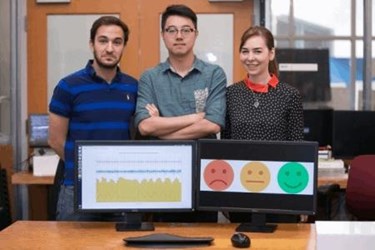MIT's EQ-Radio Detects Emotions Using Wireless Signals
By Jof Enriquez,
Follow me on Twitter @jofenriq

Using reflected radio frequency (RF) waves instead of typical on-body sensors, a radio device can analyze heartbeats and breathing patterns to detect human emotion quite accurately.
Built by researchers at MIT's Computer Science and Artificial Intelligence Lab (CSAIL), the device, called "EQ-Radio," transmits and captures radio waves bouncing off of a person’s body. A built-in algorithm then breaks down these reflected signals into individual heartbeats, and correlates the heartbeats’ intervals with one of four corresponding emotions: excited, happy, angry, or sad.
As a baseline for these emotional states, the researchers had recorded 12 participants' "ground truth" by eliciting a response from them who were made to recall a personal experience that evoked those four emotions, according to Business Insider. The device measured heart and breathing rates in two-minute sequences for each emotion, totaling to 400 total segments for all 12 participants.
The results were remarkably on-point: 87 percent accurate when the device based its predictions on a participant's own baseline, and 72 percent correct when using other people's baseline of emotions.
Compared with Microsoft’s vision-based “Emotion API,” which focuses on facial expressions, EQ-Radio was found to be significantly more accurate in detecting joy, sadness, and anger, according to an MIT news release.
Electrocardiogram (ECG) machines and similar devices rely on electrodes or body-worn sensors to analyze heartbeats and detect emotion, but they feel cumbersome and could be inaccurate due to shifts in body positioning. EQ-Radio presents a wireless, non-invasive option with a margin of error of approximately 0.3 percent to an ECG reading, according to the researchers.
“Our work shows that wireless signals can capture information about human behavior that is not always visible to the naked eye,” says project lead Dina Katabi, who co-wrote a paper on the topic with PhD students Mingmin Zhao and Fadel Adib. “We believe that our results could pave the way for future technologies that could help monitor and diagnose conditions like depression and anxiety.”
“By recovering measurements of the heart valves actually opening and closing at a millisecond time-scale, this system can literally detect if someone’s heart skips a beat,” adds Adib. “This opens up the possibility of learning more about conditions like arrhythmia, and potentially exploring other medical applications that we haven’t even thought of yet.”
Beyond medicine, MIT's radio can have other applications, reports Engadget, such as film companies monitoring audience reactions while watching a movie, or "connected" homes adjusting lighting or heating settings based on residents' moods.
